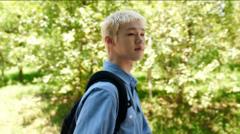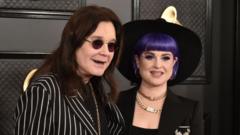**Bain’s bold announcement as part of the LGBTQ community marks a transformative moment in K-pop, challenging traditional norms within a conservative society.**
**K-pop Idol Bain Breaks Barriers with Groundbreaking Coming Out Announcement**

**K-pop Idol Bain Breaks Barriers with Groundbreaking Coming Out Announcement**
**Bain of Just B reveals his LGBTQ identity during a concert, garnering both support and scrutiny in South Korea**
In a dramatic moment during a Los Angeles concert, Bain, the 24-year-old star of the K-pop group Just B, made headlines by declaring, "I'm [expletive] proud to be part of the LGBTQ community!" This heartfelt announcement, made while wearing an oversized fur coat and dark sunglasses, ignited thunderous applause from thousands of fans, as he seamlessly transitioned into performing Lady Gaga's iconic anthem, celebrating diversity and self-acceptance.
Bain, whose real name is Song Byeonghee, represents a rare example in the historically conservative realm of K-pop. While several artists have come out in the recent past, few have done so with the same level of public exposure or during a major event. As he reflected in a subsequent interview in Seoul, he deliberately aimed to present a cool demeanor on stage, in stark contrast to the immense pressure and expectations placed on performers in the South Korean entertainment industry.
Despite warnings from industry peers about the potential backlash and possible loss of fans, Bain decided that the societal landscape was evolving, inspiring him to embrace authenticity over conformity. "I might gain more than I might lose," he stated, emphasizing the importance of visibility in an industry still grappling with conservative values.
Growing up in South Korea, much of which still harbors traditional views on homosexuality, Bain struggled with his identity. He recalled realizing he was gay around the age of 12, but felt compelled to suppress this aspect of himself while pursuing a career as a K-pop trainee. The repercussions of coming out in South Korea's culture weigh heavily, as evidenced by the experiences of earlier gay public figures, who faced significant fallout in their careers.
Bain's journey toward self-acceptance started with confiding in his mother about his sexuality three years back. The conversation was challenging, with his mother expressing initial disappointment yet ultimately offering her unconditional love and support, paving the way for Bain’s decision to publicly come out.
Since his announcement, Bain’s newfound visibility has quickly made him a figurehead for the Korean LGBTQ community. He expressed a mix of pride and sadness, noting, “I feel like I’ve changed a lot since coming out. I feel more confident. However, I’m also sad that my identity is such a big deal now.” He hopes society will eventually recognize individuals for who they are without the accompanying labels.
While attitudes toward homosexuality in South Korea have incrementally progressed—evidenced by a 2019 Pew survey showing a rise in public acceptance—coming out remains a taboo. Bain's move comes at a time when the K-pop landscape is facing heightened scrutiny and conflicting cultural opinions, especially from conservative factions.
His announcement has resonated deeply within both domestic and international communities. Fans have lauded his courage, with many expressing how his openness alleviated feelings of isolation. A 26-year-old transgender woman noted that Bain’s bravery has provided hope and comfort to those navigating their unique challenges.
Nevertheless, Bain's choice also reflects the complexities within the K-pop market. With a predominantly female fanbase, the fear of shattered fantasies around male idols’ sexuality presents a unique challenge. While Bain’s decision marks a significant personal triumph and signifies a gradual shift within K-pop, industry paradigms shift slowly, with many public figures still reluctant to disclose personal matters due to fear of ramifications.
Despite the uphill battle ahead for increasing LGBTQ visibility in the industry, Bain remains resilient, seeing his journey as a beacon of hope for aspiring idols struggling with their identities. He remarked, “If even one person in K-pop gains strength or interest from my coming out, it would be worth it.” Several fans reached out to him, revealing their own experiences and identities, reinforcing Bain's conviction that living truthfully is liberating.
Bain’s coming out not only challenges the stifling silence surrounding sexuality in K-pop but also paves the way for more inclusive narratives within a culture still navigating the intersections of tradition and progressive ideals.
Bain, whose real name is Song Byeonghee, represents a rare example in the historically conservative realm of K-pop. While several artists have come out in the recent past, few have done so with the same level of public exposure or during a major event. As he reflected in a subsequent interview in Seoul, he deliberately aimed to present a cool demeanor on stage, in stark contrast to the immense pressure and expectations placed on performers in the South Korean entertainment industry.
Despite warnings from industry peers about the potential backlash and possible loss of fans, Bain decided that the societal landscape was evolving, inspiring him to embrace authenticity over conformity. "I might gain more than I might lose," he stated, emphasizing the importance of visibility in an industry still grappling with conservative values.
Growing up in South Korea, much of which still harbors traditional views on homosexuality, Bain struggled with his identity. He recalled realizing he was gay around the age of 12, but felt compelled to suppress this aspect of himself while pursuing a career as a K-pop trainee. The repercussions of coming out in South Korea's culture weigh heavily, as evidenced by the experiences of earlier gay public figures, who faced significant fallout in their careers.
Bain's journey toward self-acceptance started with confiding in his mother about his sexuality three years back. The conversation was challenging, with his mother expressing initial disappointment yet ultimately offering her unconditional love and support, paving the way for Bain’s decision to publicly come out.
Since his announcement, Bain’s newfound visibility has quickly made him a figurehead for the Korean LGBTQ community. He expressed a mix of pride and sadness, noting, “I feel like I’ve changed a lot since coming out. I feel more confident. However, I’m also sad that my identity is such a big deal now.” He hopes society will eventually recognize individuals for who they are without the accompanying labels.
While attitudes toward homosexuality in South Korea have incrementally progressed—evidenced by a 2019 Pew survey showing a rise in public acceptance—coming out remains a taboo. Bain's move comes at a time when the K-pop landscape is facing heightened scrutiny and conflicting cultural opinions, especially from conservative factions.
His announcement has resonated deeply within both domestic and international communities. Fans have lauded his courage, with many expressing how his openness alleviated feelings of isolation. A 26-year-old transgender woman noted that Bain’s bravery has provided hope and comfort to those navigating their unique challenges.
Nevertheless, Bain's choice also reflects the complexities within the K-pop market. With a predominantly female fanbase, the fear of shattered fantasies around male idols’ sexuality presents a unique challenge. While Bain’s decision marks a significant personal triumph and signifies a gradual shift within K-pop, industry paradigms shift slowly, with many public figures still reluctant to disclose personal matters due to fear of ramifications.
Despite the uphill battle ahead for increasing LGBTQ visibility in the industry, Bain remains resilient, seeing his journey as a beacon of hope for aspiring idols struggling with their identities. He remarked, “If even one person in K-pop gains strength or interest from my coming out, it would be worth it.” Several fans reached out to him, revealing their own experiences and identities, reinforcing Bain's conviction that living truthfully is liberating.
Bain’s coming out not only challenges the stifling silence surrounding sexuality in K-pop but also paves the way for more inclusive narratives within a culture still navigating the intersections of tradition and progressive ideals.





















